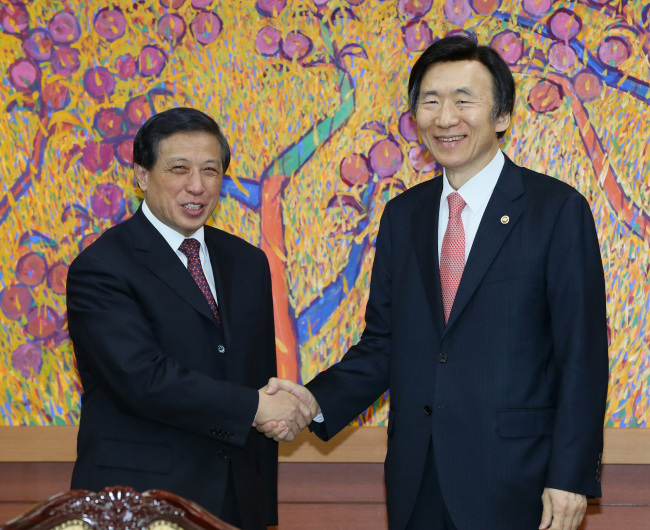China’s vice foreign minister on Tuesday once again expressed the country’s opposition to an envisaged stationing of advanced U.S. missile assets on the peninsula, calling for Seoul’s “prudent” conduct.
Zhang Yesui was in Seoul for the annual Strategic Dialogue with South Korean Vice Foreign Minister Lim Sung-nam, which was designed to confer on North Korea, bilateral, regional and world issues.
 |
China’s Vice Foreign Minister Zhang Yesui is greeted by South Korean Foreign Minister Yun Byung-se in Seoul on Tuesday. (Yonhap) |
But the meeting, which would otherwise have focused on the ongoing discussions over sanctions against Pyongyang for its recent nuclear and missile tests, was eclipsed by Beijing’s stern resistance to Washington’s plans to deploy a battery of the Terminal High Altitude Area Defense system here.
“We exchanged views on the THAAD issue and we expressed our opposition. I hope the related parties will act prudently,” Zhang told reporters after the talks with Lim.
On the forthcoming penalties on North Korea, he reaffirmed China’s commitment to a nuclear-free peninsula and its peace and stability, while stressing the significance of talks to resolve the conundrum.
The sanctions move at the U.N. Security Council has been unprecedentedly drawn out as its members are struggling to close the gaps in their positions. The U.S. is pushing for much stricter bans such as targeting the North’s banking and finance, but China remains reluctant.
“We support the passage of a new, strong sanctions resolution. At the same time, however, we should explore ways to positively tackle the issue through dialogue and negotiations,” he added.
Lim, for his part, briefly mentioned that the two top diplomats reached a “perceptional consensus” on the need for the swift adoption of “strong, effective” sanctions, but refused to provide details about the exchanges on THAAD, citing diplomatic protocols.
“I sufficiently explained our stance,” he said during a separate encounter with reporters, without elaborating.
Since Seoul’s announcement on Feb. 7 of formal talks with Washington on the THAAD deployment, Beijing has voiced its protest since it regards the equipment as part of a U.S.-led global missile defense program aimed at it.
Zhang was the first high-level Chinese official to visit here in the aftermath of the North’s Jan. 6 atomic blast and Feb. 7 long-range missile firing. He arrived Monday and visited Foreign Minister Yun Byung-se and senior presidential foreign affairs and security secretary Kim Kyou-hyun later in the day.
The strategic dialogue was launched in December 2008 and last held in June 2013.
By Shin Hyon-hee (
heeshin@heraldcorp.com)








